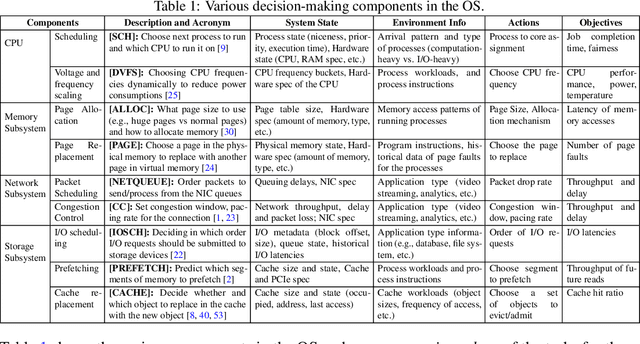Sebastian Angel
On a Foundation Model for Operating Systems
Dec 13, 2023

Abstract:This paper lays down the research agenda for a domain-specific foundation model for operating systems (OSes). Our case for a foundation model revolves around the observations that several OS components such as CPU, memory, and network subsystems are interrelated and that OS traces offer the ideal dataset for a foundation model to grasp the intricacies of diverse OS components and their behavior in varying environments and workloads. We discuss a wide range of possibilities that then arise, from employing foundation models as policy agents to utilizing them as generators and predictors to assist traditional OS control algorithms. Our hope is that this paper spurs further research into OS foundation models and creating the next generation of operating systems for the evolving computing landscape.
Flamingo: Multi-Round Single-Server Secure Aggregation with Applications to Private Federated Learning
Aug 19, 2023Abstract:This paper introduces Flamingo, a system for secure aggregation of data across a large set of clients. In secure aggregation, a server sums up the private inputs of clients and obtains the result without learning anything about the individual inputs beyond what is implied by the final sum. Flamingo focuses on the multi-round setting found in federated learning in which many consecutive summations (averages) of model weights are performed to derive a good model. Previous protocols, such as Bell et al. (CCS '20), have been designed for a single round and are adapted to the federated learning setting by repeating the protocol multiple times. Flamingo eliminates the need for the per-round setup of previous protocols, and has a new lightweight dropout resilience protocol to ensure that if clients leave in the middle of a sum the server can still obtain a meaningful result. Furthermore, Flamingo introduces a new way to locally choose the so-called client neighborhood introduced by Bell et al. These techniques help Flamingo reduce the number of interactions between clients and the server, resulting in a significant reduction in the end-to-end runtime for a full training session over prior work. We implement and evaluate Flamingo and show that it can securely train a neural network on the (Extended) MNIST and CIFAR-100 datasets, and the model converges without a loss in accuracy, compared to a non-private federated learning system.
 Add to Chrome
Add to Chrome Add to Firefox
Add to Firefox Add to Edge
Add to Edge